|
|
|
Sort Order |
|
|
|
Items / Page
|
|
|
|
|
|
|
| Srl | Item |
| 1 |
ID:
192923
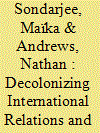

|
|
|
|
|
| Summary/Abstract |
Over the past decade, there has been a new “decolonial turn,” albeit less related than before to land and political independence. “To decolonize” is now associated with something less tangible and often under-defined. We argue that scholars, especially Western ones, should avoid depoliticizing the expression “decolonizing” by using it as a buzzword. Scholars and policymakers should use the expression only if it is closely related to the political meaning ascribed to it by Global South and Indigenous activists and scholars. Decoloniality is a political project of human emancipation through collective struggles, entailing at least the following: 1) abolishing racial hierarchies within the hetero-patriarchal and capitalist world order, 2) dismantling the geopolitics of knowledge production, and 3) rehumanizing our relationships with Others and nature. We conclude that there is a need for epistemic humility and that Western scholars and institutions must refrain from using the word too freely.
|
|
|
|
|
|
|
|
|
|
|
|
|
|
|
|
| 2 |
ID:
177708
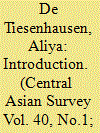

|
|
|
|
|
| Summary/Abstract |
Central Asian art and culture have been gaining increased attention both within the region and on the international scene. This special issue brings together scholars and participants in the Central Asian cultural scene who specialize in different, often isolated, spheres. This multidisciplinary approach will enhance understanding of the current trends of display, presentation, accessibility and analysis that relate to individual countries, as well as to the entire region. Some articles are by established scholars; most have resulted from extensive field research. The papers question existing notions of history and memory production by applying a decolonial discourse. Ultimately, the main unifying theme is that of identity and its formation, including national, ethnic, cultural, religious and gender. The main purpose of this special issue is to try to understand the role the cultural scene plays in society, the issues raised by cultural production and the shape it could take. The collection of papers here seeks to explore whether culture offers a representation of society and its potential for change, or the vehicle through which such change can be achieved.
|
|
|
|
|
|
|
|
|
|
|
|
|
|
|
|
| 3 |
ID:
181816
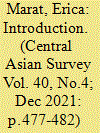

|
|
|
|
|
| Summary/Abstract |
In the last 30 years since the advent of independence, the field of Central Asian studies has become more diverse and new generations of scholars have emerged. This issue assembles seven articles by 10 authors who represent the field at large. In addition to embracing the growing field, the authors critique what they view as remaining misinterpretations or omissions in their respective disciplines. Exciting innovations for understanding Central Asia continue to flourish from the region as well as in collaboration with international partners. The coming decade is a turning point for the Central Asian studies – a time to host spirited debates and explore experimental approaches, new theories and topics.
|
|
|
|
|
|
|
|
|
|
|
|
|
|
|
|
| 4 |
ID:
178132
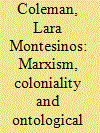

|
|
|
|
|
| Summary/Abstract |
At the heart of Global Capitalism, Global War, Global Crisis is a revolt against fetishism: the appeal to abstract categories, treating concepts as if they referred to things ‘out there’ in the world, independent of social relations). It is commonplace to note that studies of international relations routinely fetishise a system of ‘sovereign’ states, abstracted from history and the social relations, practices and ideologies that sustain state power. What Bieler and Morton emphasise is that even ‘Left’ analyses routinely make fetishistic appeal to concepts – ‘the state’, ‘the market’, ‘security’, ‘production’, ‘finance’, ‘knowledge’ – which are treated as things-in-themselves, devoid of human beings in their concrete social relations.1 Despite some scholars’ careless applications of the label ‘Marxist’ to such work, Bieler and Morton’s critique is very much in line with Marx’s own critique of a tradition of classical political economy so beholden to the modern obsession with uniformity and universality that it forcibly read history through the categories of bourgeois ideology (abstract individuals interacting in ‘the market’ and so on) that were made to look like ‘general preconditions of all production’
|
|
|
|
|
|
|
|
|
|
|
|
|
|
|
|
| 5 |
ID:
151509
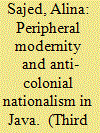

|
|
|
|
|
| Summary/Abstract |
This analysis investigates the limits of colonial modernity in the 20th century Dutch East Indies at a time that coincided with the building of the Indonesian national project. I am interested in the constitution of the national teleology as an inexorable socio-political project, deploying specific racial and gendered economies. As a locus of investigation I choose the literary narratives of two celebrated Indonesian intellectuals (and participants in the anti-colonial struggle), Pramoedya’s Buru Quartet and Mangunwijaya’s Durga/Umayi. Were the impulses of anti-colonial resistance intrinsically national in their orientation? Through what erasures and re-appropriations has the nationalism/modernity paradigm become the medium of decolonisation?
|
|
|
|
|
|
|
|
|
|
|
|
|
|
|
|
|
|
|
|
|